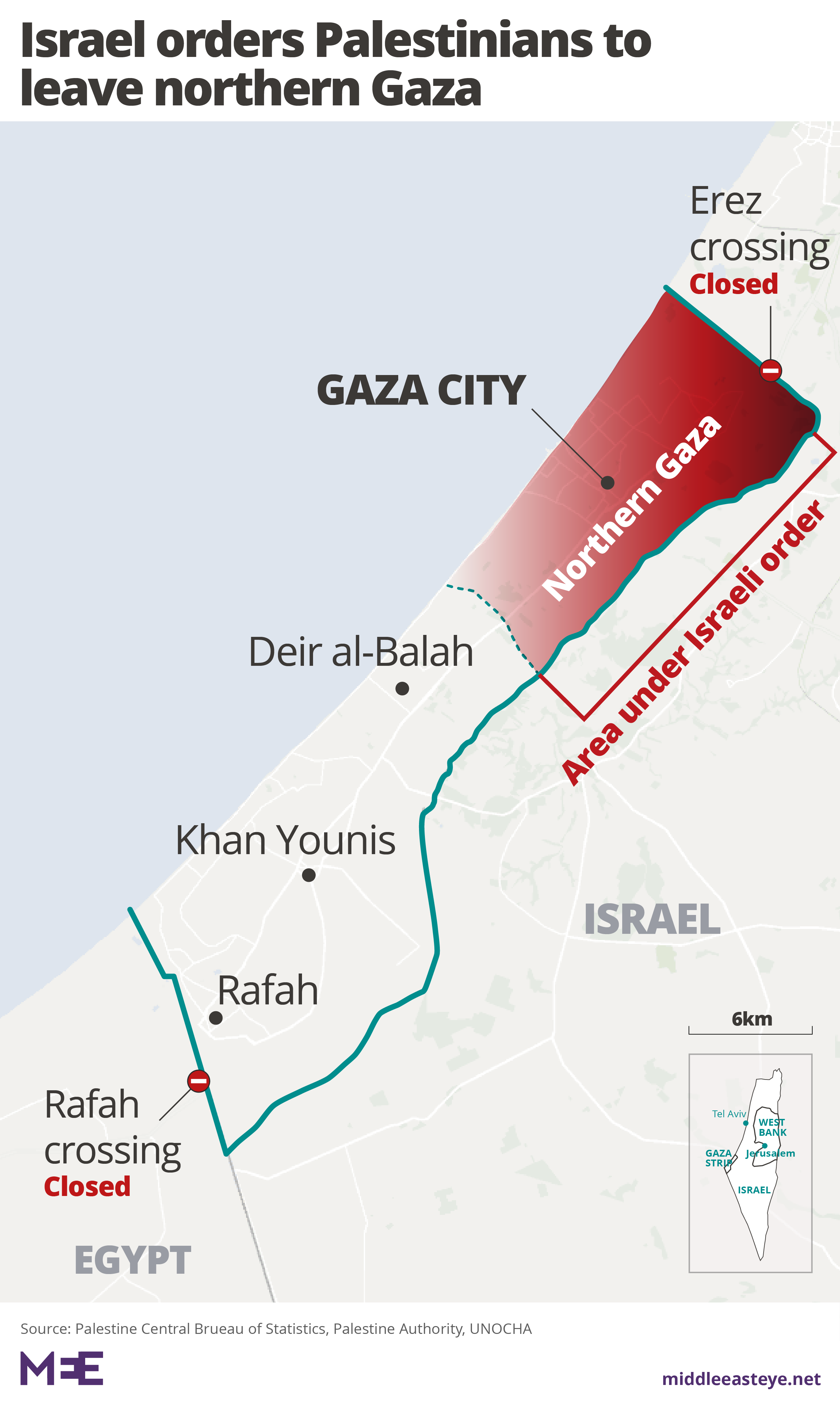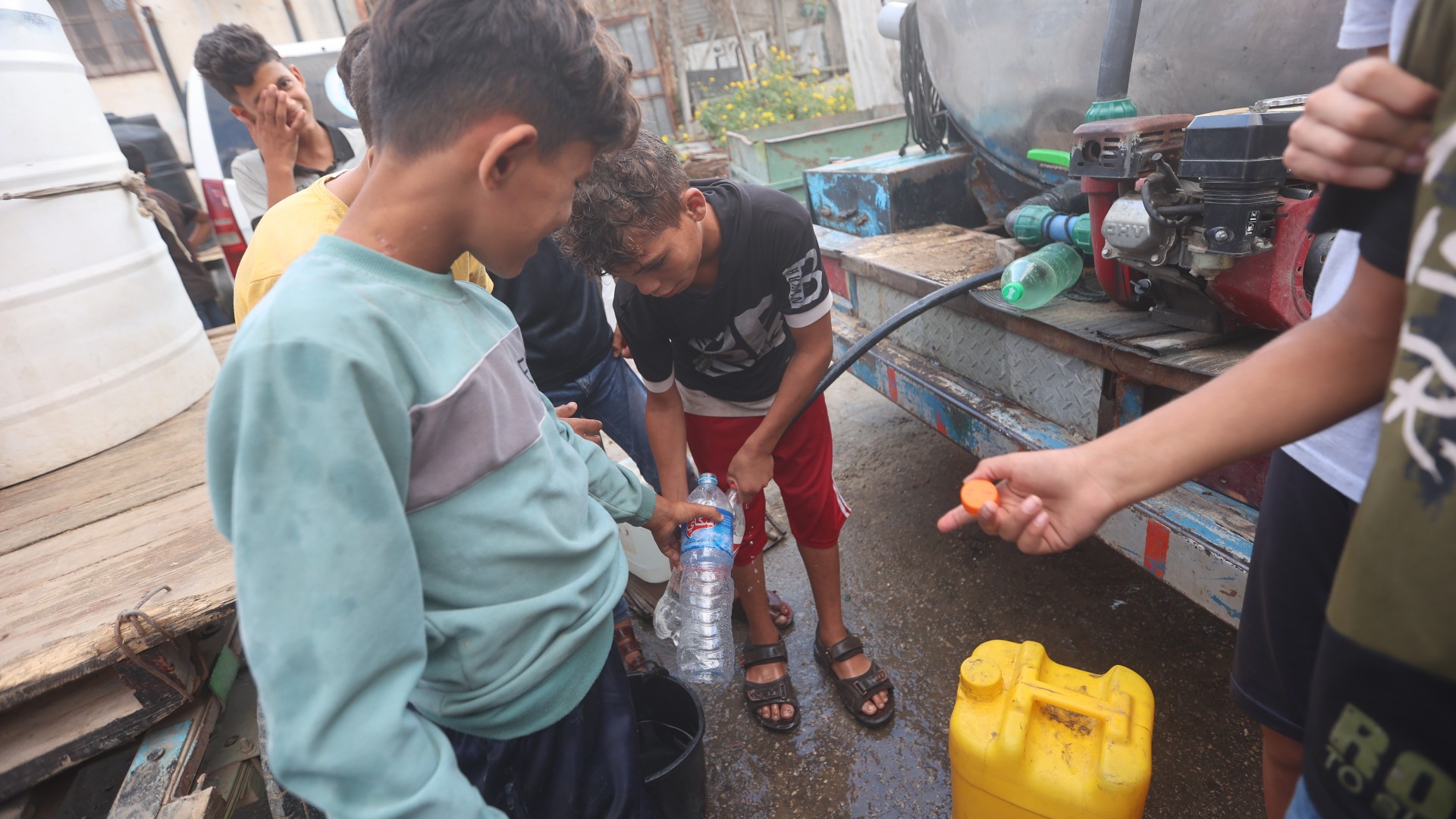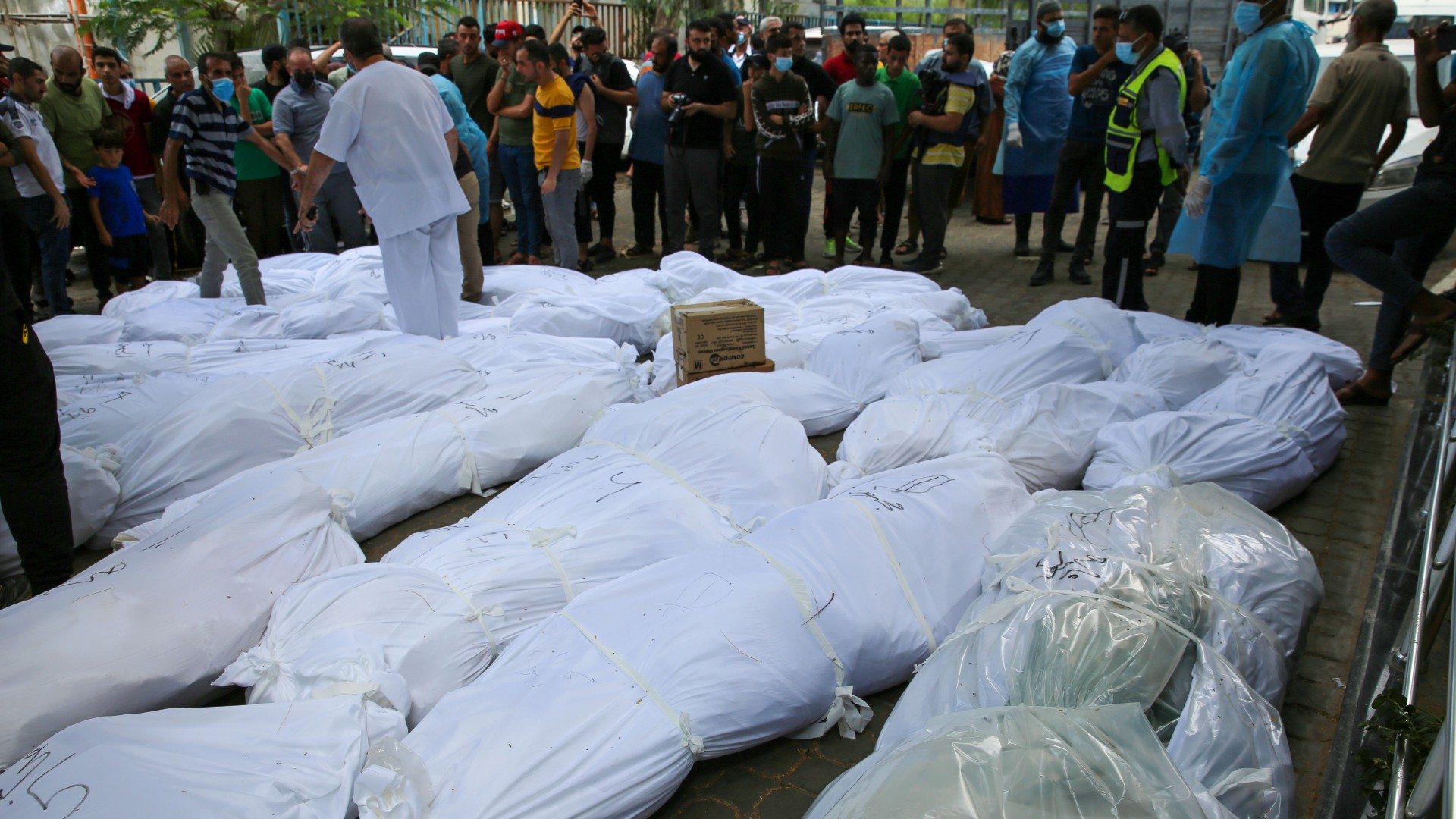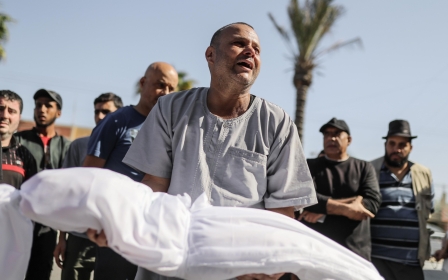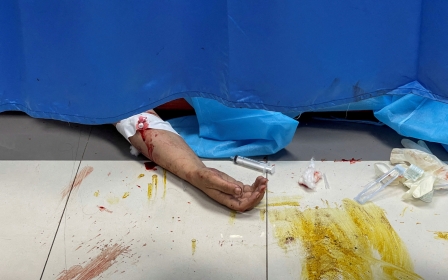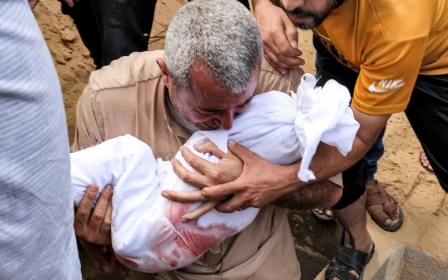Israel-Palestine war: Civilians fleeing northern Gaza find no escape from danger

Palestinians scrambled to escape northern Gaza for a third successive day on Sunday, as Israeli air strikes pounded the besieged enclave and Israel intensified warnings of an imminent ground invasion.
Thousands of Palestinians have been streaming south after Israel ordered around 1.1 million Palestinians to leave their homes on Friday and offered no guarantees of their return.
Israel has already unleashed the fiercest bombing ever on the impoverished Gaza Strip, one of the most densely populated areas in the world.
Far worse is expected in the coming days, prompting many to seek safe shelter wherever they can.
Raeda Ashqar, 45, is among the thousands of Palestinians who have already left their homes. She told Middle East Eye that she was prepared to do whatever was necessary for the survival of her family.
New MEE newsletter: Jerusalem Dispatch
Sign up to get the latest insights and analysis on Israel-Palestine, alongside Turkey Unpacked and other MEE newsletters
She said that she left northern Gaza along with her four children after finding shelter at her daughter-in-law's apartment in the south.
"Some of our friends who have fled told us they have to sleep on chairs due to limited spaces [in the homes] where they sought refuge," Ashqar told MEE, adding that she felt no qualms with having to share the tiny apartment with four other families.
The UN agency for Palestinian refugees (Unrwa), which provides healthcare and education to millions of Palestinians, called on Israeli authorities on Saturday to ensure the safety of all civilians seeking refuge at its facilities throughout the strip.
"Wars have rules," the agency said in a statement. "Civilians, hospitals, schools, clinics and United Nations premises cannot be a target.
"Unrwa is sparing no efforts to advocate with parties to the conflict to meet their obligations under international law to protect civilians."
Follow Middle East Eye's live coverage for the latest on the Israel-Palestine war
Adnan Abu Hasna, Unrwa's Gaza spokesperson, told MEE that hundreds of thousands of people had now sought shelter at schools in the south, leading to overcrowding.
"People are spending the night in the school yards and the schools are running out of water," he said.
"The humanitarian situation is disastrous."
'We are struggling to provide everyone in the house with food and water'
- Siham Saleem, Gaza City resident
The latest fighting erupted on 7 October when Palestinians fighters launched a surprise multi-front assault on Israel, firing thousands of rockets and sent gunmen into Israeli territory across land, air and sea.
More than 1,300 Israelis were killed and scores of soldiers and civilians were taken captive back to Gaza during the attack, which the fighters says was launched in response to Israeli violence targeting Palestinians in the West Bank and incursions into Al-Aqsa Mosque.
Since then, Israel has killed at least 2,450 people in Gaza, according to the Palestinian health ministry. Of those killed, 724 are children and 458 are women.
Over the same period, Israeli troops and settlers have also killed 56 people in the occupied West Bank.
'Matter of life and death'
Ashqar said that while evading air strikes and being displaced were a major challenge for the family, access to potable water was another issue they had to contend with.
"We're running out of water. We don't have water for drinking or for cleaning," she said. "I'm very worried about my children's health."
Fears are growing that Israel's decision to sever food, fuel, water and electricity from entering the enclave of more than two million people could cause the civilian death toll to spike.
Unrwa has warned that clean water was running out at its schools, with Palestinians forced to use dirty water from wells, increasing the risk of waterborne diseases.
"It's become a matter of life and death," said Philippe Lazzarini, the Unrwa commissioner-general.
"It is a must. Fuel needs to be delivered now into Gaza to make water available for two million people."
Israel's energy minister, Israel Katz, has said that no "electrical switch will be turned on, no water hydrant will be opened and no fuel truck will enter" until the "abductees" were free.
UN experts have condemned Israel's bombardment as "collective punishment", which is a war crime.
'Our safety is not a priority for Israel'
Meanwhile, Israel has said it was keeping two roads open to let people escape the north, but displaced Palestinians fleeing on that road said bombings near there have never stopped.
On Friday, at least 70 Palestinians were killed and 200 were wounded when Israeli planes bombed several vehicles carrying displaced Palestinians, according to the health ministry.
Ibrahim Abed, a 22-year-old resident of the Jabalia refugee camp in the northern Gaza Strip, said he and his family declined to comply with the Israeli directive as they didn't believe Israel would guarantee their safety.
"Based on our previous experiences with the Israeli enemy, we understand that our safety is not a priority for them," Abed told MEE.
"We had doubts about the southern region being any safer or that we wouldn't be subject to targeting during our journey.
"[After seeing pictures and videos of the 70 Palestinians who were killed] I prefer to be killed in my home and not be displaced, not even for a minute."
No words can describe the situation
Several Gaza residents also told MEE that even if they made the treacherous trip south, it was highly unlikely Egypt would open its borders and they would still face Israeli bombardment in the south.
Siham Saleem, 43, chose to stay at her home in Gaza City after a discussion with her husband. They thought that if they were killed in their apartment, at least they could be easily identified.
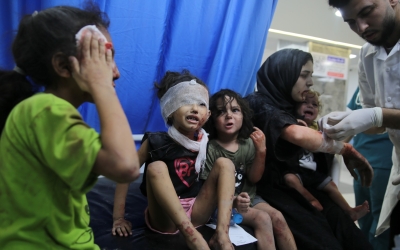
Saleem said that she already hosts her in-laws whose house was demolished on the first day of the attacks.
"We are struggling to provide everyone in the house with food and water. I cook food everyday; however this means we will run out of cooking gas soon," she told MEE.
Saleem also says the sight of her neighbours holding empty buckets looking for water is something that will forever be etched in her memory.
"This scene reminded me of all the terrible wars we [have] watched on TV before," she said.
"No words can describe how hard this time is."
Middle East Eye delivers independent and unrivalled coverage and analysis of the Middle East, North Africa and beyond. To learn more about republishing this content and the associated fees, please fill out this form. More about MEE can be found here.


